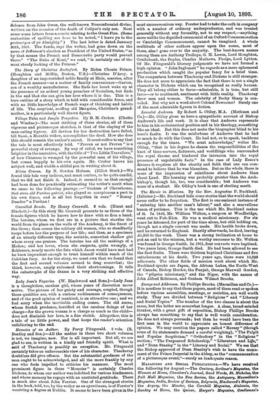is not, we imagine, new. Nor is all important. But
all, we are glad to see, is written in a kindly and friendly spirit. What is said of Thackeray is possibly an exception. Mr. Fitzgerald certainly takes an unfavourable view of his character. Thackeray
doubtless did give offence. But the substantial goodness of the man ought to be acknowledged, and all the more frankly by any
one who feels impelled to criticise his manners. The most prominent figure in these " Memoirs " is certainly Charles Dickens, to whom our author was indebted for various kindnesses, and whose memory he repays with an unstinted gratitude. There is much also about John Forster. One of the strangest stories in the book, told, too, by the writer as an eyewitness, is of Forster's receiving a degree at Dublin. It seems to have been given in the most unceremonious way. Forster had to take the oath in company with a number of ordinary undergraduates, and was treated generally without any formality, not to say respect,—anything more unlike the dignified ceremonial of an Oxford Commemoration or Cambridge Commencement, cannot be imagined. A whole multitude of other authors appear upon the scene, most of them, alas ! gone over to the majority. The best-known names among them are Anthony Trollope, G. H. Lewes, Lord Houghton, Cruikshank, the Doyles, Charles Mathews, Phelps, Lord Lytton. Of Mr. Fitzgerald's literary judgments we have not formed a high opinion. "John Inglesant " he regards as a mere ephemeral production which caught the popular fancy for a brief time. The comparison between Thackeray and Dickens is still stranger. He does not seem to appreciate the fact that there is not a single character in Dickens which can be recognised as really human. They all belong either to farce—admirable, it is true, but still farce—or to sentiment, sentiment with little reality. Thackeray drew men and women. The celebrity of Becky Sharp is con- ceded. But why not a word about Colonel Newcome ? Surely one of the most admirable figures in fiction.


































 Previous page
Previous page